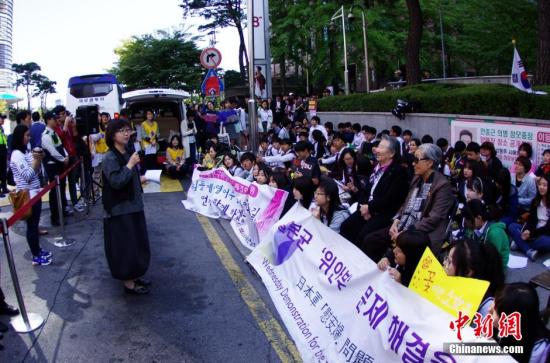China News Service, April 21. According to Korean media reports, the South Korean court rejected the second lawsuit filed by South Korean comfort women victims against the Japanese government.
On the morning of the 21st local time, the 15th Civil Collegiate Chamber of the Central District Court of South Korea rejected the claim against Japan initiated by 20 victims of comfort women such as Lee Yong-soo and the deceased victims of comfort women such as Kim Bok Tong and their family members.
Data map: On October 8, 2014 local time, some South Korean Japanese military comfort women victims and human rights support groups took a sit-in in front of the Japanese Embassy in South Korea to protest, asking the Japanese government to reflect on history and to force the Japanese military to recruit comfort women during World War II Make a formal apology for the behavior.
Photo by Jia Tianyong issued by China News Agency
According to reports, the dismissal of the lawsuit means that the conditions of the lawsuit are not met.
The court held that Japan enjoys national sovereignty immunity, that is, it is not subject to the jurisdiction of Korean courts.
The court explained that if the sovereign immunity of the country is determined, diplomatic conflicts will inevitably occur in the process of sentencing and enforcement.
The court also pointed out that the 2015 agreement between South Korea and Japan on the issue of comfort women has a diplomatic form and has the nature of rights relief. Although the views of the victims were not sought in the negotiation process, there are certain problems in content and procedures, but it is difficult to just Based on these, it is determined that the government has exceeded or abused its discretion.
The agreement was reached by both parties, and it is impossible to implement only the position of the South Korean side. Although the text of the agreement failed to obtain the consent of the victims, after all, the opinion solicitation process was followed. Some victims also received compensation in the form of cash from the Settlement Healing Foundation. gold.
In the end, the South Korean court stated that the victims have been tortured. The efforts and achievements of the South Korean state do not seem to be enough to heal the wounds and compensate for the losses. However, the resolution of comfort women issues such as restoration of reputation and compensation for losses requires efforts including diplomatic negotiations. .
This conclusion contrasts with the victory of the first comfort women's claim in January.
The first complaint against Japan filed by the late Bae Chunji and other 12 comfort women victims and their family members, was tried by the 34th Chamber of the Civil Collegiate of the Seoul Central District Court and was sentenced to victory.
The court held that Japan’s illegal acts were not included in the sovereign immunity of the country and recognized the jurisdiction of the Korean court.
Because Japan did not respond to this, only this first-instance judgment became the final judgment of the case.

